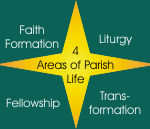

 |
|
 |
|
Homily for February 5th, 2006.
Caution: Putting a Sunday homily on the Website is tricky business. All the viewer has is a written text. A homily, on the other hand, is "an oral event". It may not have been said or heard the way it was written. In addition, a roughly ten-minute homily is part of a roughly one-hour worship event in which God and God's people communicate with each other by means of ritual, symbol, song, proclamation, prayer. Not everything in these homilies is original. As a homilist, I rely on and at times borrow from other homilists and writers who are not properly mentioned in this format. I am often indebted to them. Father William Marrevee, s.c.j.
5th Sunday of Ordinary Time Year B The first reading is taken from the Book of Job. We get only a snippet of it. But even in this little piece we see Job trying to make sense of life, trying to make sense of God in the midst of the experience of life not being reasonable. The story starts off with Job as a good, honourable man. But, then, in a brief space of time everything is taken from him: his possessions, his home, his family, his health. He is struck with a disease that causes him much pain. His life is turned upside down. Job is bewildered, confused. He cannot make any sense of life any more, he cannot make any sense of God any more. The “beauty” of the Book of Job is that it has Job bring this misery of his life before God. He lets God know about his miserable and bewildering condition, even to the point of cursing the day he was born. Job gives us a model, a pattern for dealing with difficult nights and days; with nights when it seems that day will never come, with days when we concretely experience how miserable and fragile, if not in fact how stupid life can be. In that condition speaking to God in tears, in lamentation, in complaint is not a lack of faith, is not a weak faith; it may be the only authentic faith possible. In that condition Job has no use of easy answers or religious clichés. When his religious friends, with the best of intentions, come to console him, Job is not impressed. When his friends suggest that he suffers as a punishment for his sins, then Job declares his innocence. When they suggest that in his misfortune, God is putting him to the test, Job boldly says that he has no use for that kind of a God. And then at the end of the book the author has God appearing on the scene. Contrary to what we may expect, God does not back up the arguments of Job’s friends. No God takes the side of Job. God does not accuse Job of a lack of faith. In fact, God commends him. The Job who has protested, who has rebelled, who has cursed the day he was born, is declared to be God’s friend. Job experiences God in a new way, and that is what brings Job healing; that is what sustains him. It is expressed in the psalm refrain after the first reading: “Praise the Lord, who heals the broken-hearted.” Mind you, there is a fair distance between the words of Job and the words of the psalm. We have to honour that distance, as that distance will in most instances be covered by a lot of sweat and tears. But it is God’s assurance that the distance can indeed by covered, that Job can trust God’s saving presence. |
|||||
| © Copyright 2025 Our Lady of Victory / St-Malachy Site
490 Charles Street • Gatineau • Quebec • J8L 2K5 Telephone: (819) 986-3763 Website powered by Arvixe Web Hosting |